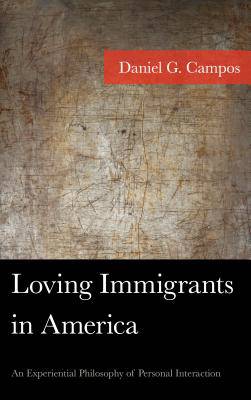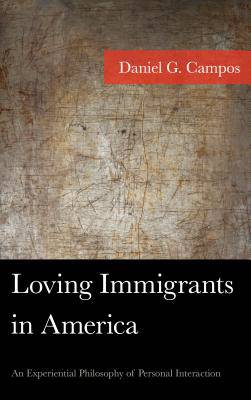
- Afhalen na 1 uur in een winkel met voorraad
- Gratis thuislevering in België vanaf € 30
- Ruim aanbod met 7 miljoen producten
- Afhalen na 1 uur in een winkel met voorraad
- Gratis thuislevering in België vanaf € 30
- Ruim aanbod met 7 miljoen producten
Zoeken
€ 208,95
+ 417 punten
Uitvoering
Omschrijving
At once narrative and reflective, Loving Immigrants in America: An Experiential Philosophy of Personal Interaction is a philosophical account of Daniel Camposʼs experience as a Latin American immigrant to the United States of America. A series of interrelated personal essays together convey this experience of walking or sauntering, going on road trips, reading American literature in the southern United States, playing association football (soccer or fútbol), churchgoing, and Latin dancing in the U.S. This book's central motif is the caring saunterer, who is understood to be a person who makes him or herself at home anywhere, even as a Latino immigrant in the U.S. The narrative essays convey one immigrant's experience seeking an affective, social, and intellectual home in a new land. The intertwined philosophical reflections lead to the recommendation of an ethic of love--resilient love--for the day-to-day interactions and long-term relations between immigrants and hosts in this country.
The author's aim is to establish an open and earnest philosophical dialogue with critical readers interested in the problems surrounding immigration in the U.S. today. He writes as an American philosopher--in the continental sense of North, Central, and South America--whose reflections provide an accessible and provocative angle for the development of insight into the experiences of immigrants in the United States. Thus he brings philosophical reflection drawn from experience, in the broad American tradition, to bear on current issues--on the problems of people and not of philosophers, as John Dewey might put it.
The author's aim is to establish an open and earnest philosophical dialogue with critical readers interested in the problems surrounding immigration in the U.S. today. He writes as an American philosopher--in the continental sense of North, Central, and South America--whose reflections provide an accessible and provocative angle for the development of insight into the experiences of immigrants in the United States. Thus he brings philosophical reflection drawn from experience, in the broad American tradition, to bear on current issues--on the problems of people and not of philosophers, as John Dewey might put it.
Specificaties
Betrokkenen
- Auteur(s):
- Uitgeverij:
Inhoud
- Aantal bladzijden:
- 282
- Taal:
- Engels
- Reeks:
Eigenschappen
- Productcode (EAN):
- 9781498547840
- Verschijningsdatum:
- 30/08/2017
- Uitvoering:
- Hardcover
- Formaat:
- Genaaid
- Afmetingen:
- 155 mm x 231 mm
- Gewicht:
- 612 g

Alleen bij Standaard Boekhandel
+ 417 punten op je klantenkaart van Standaard Boekhandel
Beoordelingen
We publiceren alleen reviews die voldoen aan de voorwaarden voor reviews. Bekijk onze voorwaarden voor reviews.











